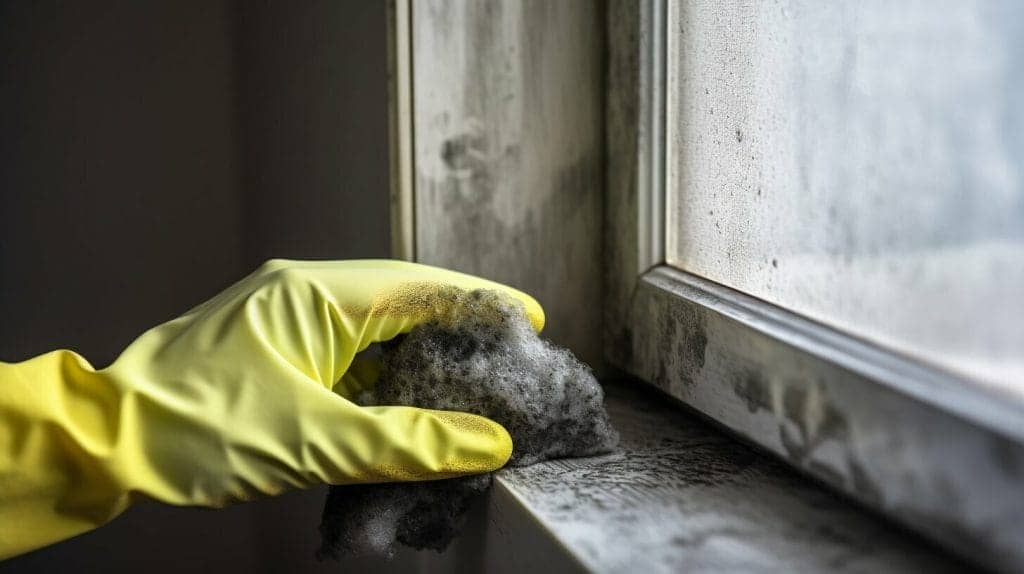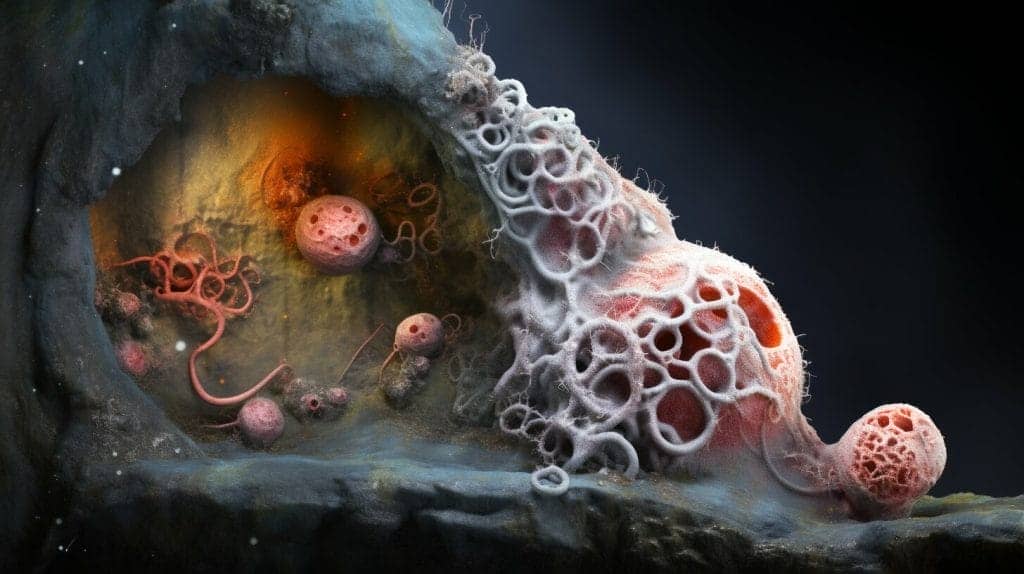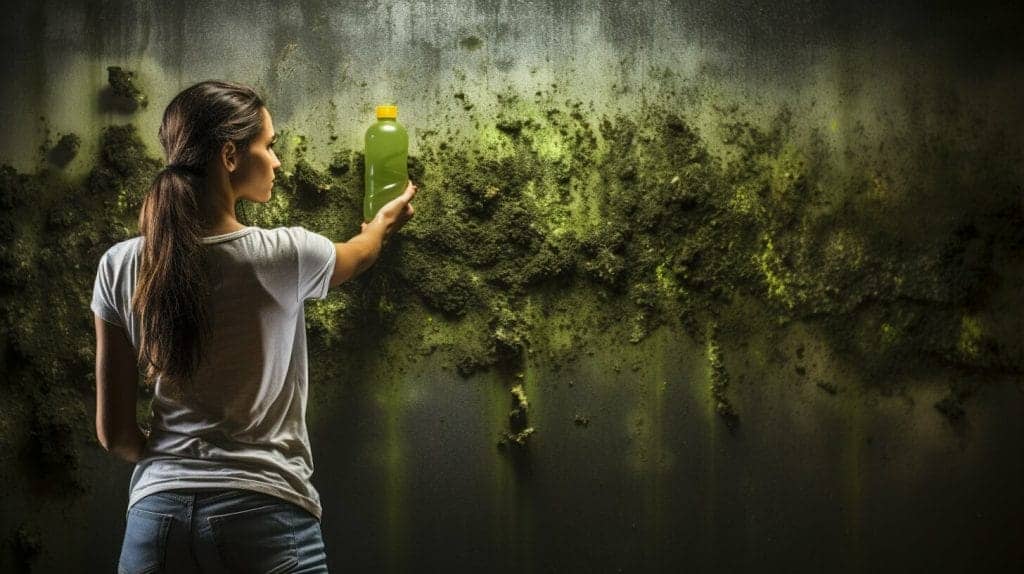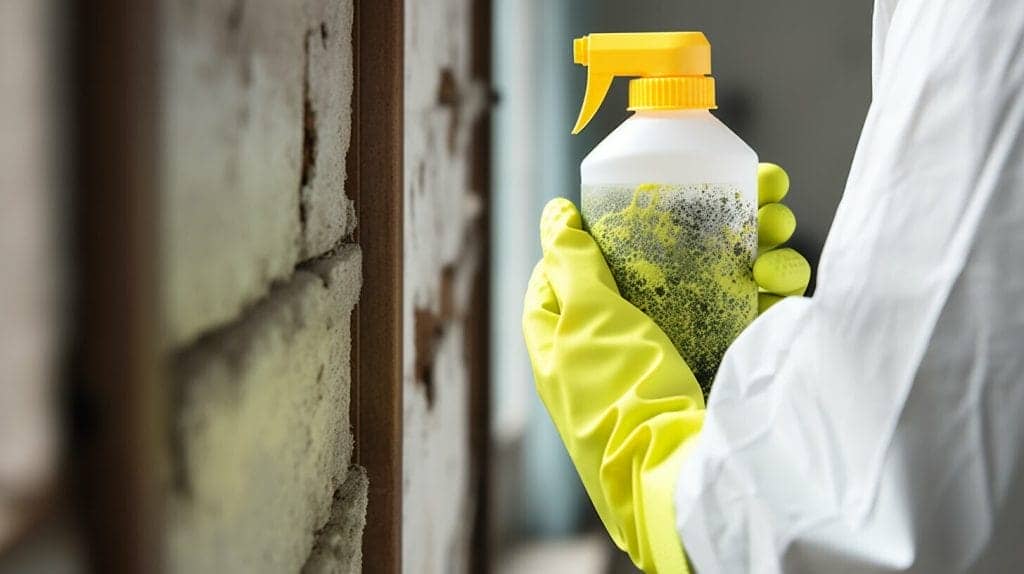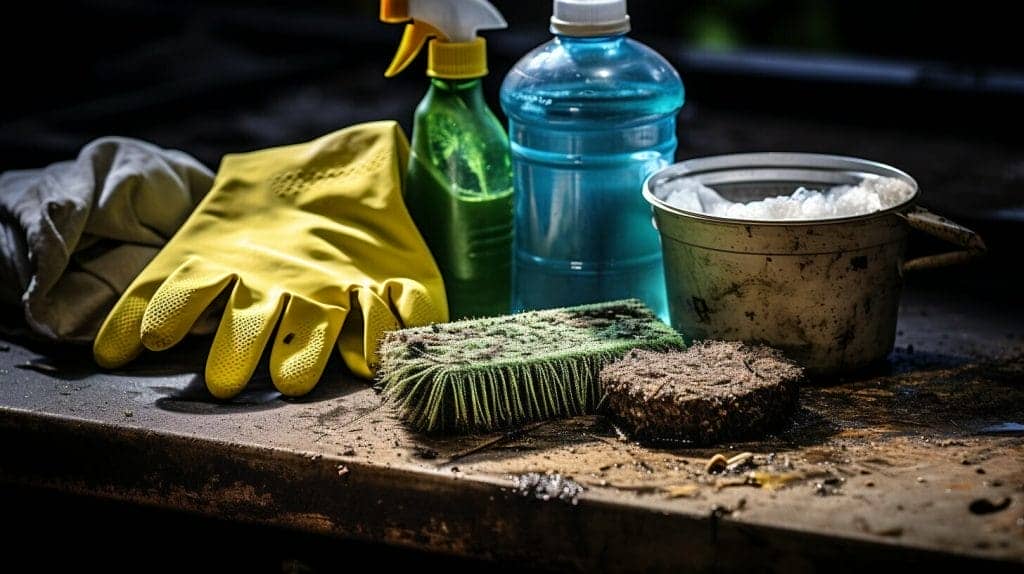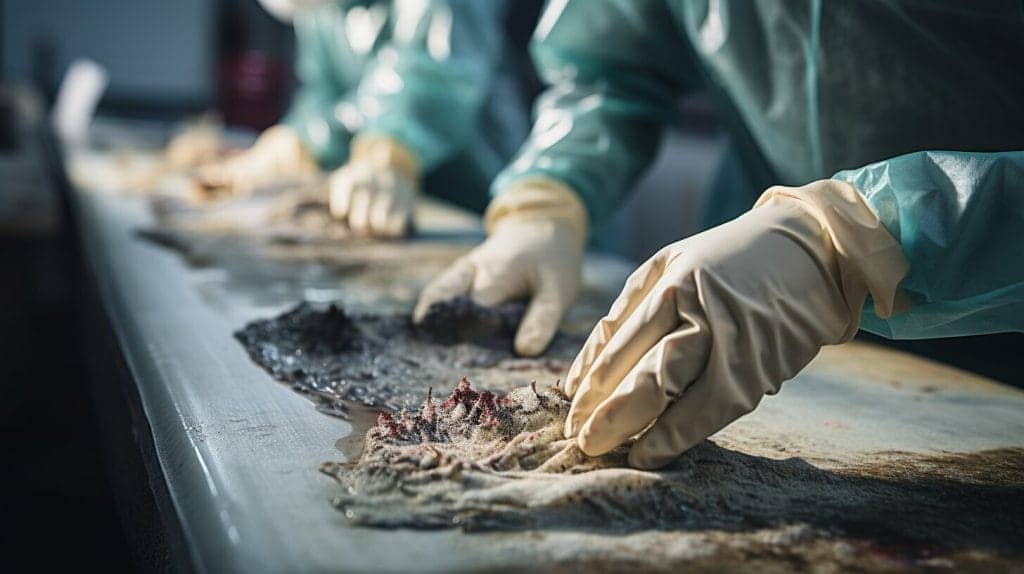Welcome to our article exploring the potential link between mold toxicity and weight gain. Mold toxicity is a serious health concern that affects millions of people worldwide. It can cause a range of symptoms, including respiratory issues, skin rashes, and digestive problems. In recent years, there has been increasing interest in the potential link between mold toxicity and weight gain.
While the research in this area is still in its early stages, some studies suggest that there may be a connection between mold exposure and weight gain. In this article, we will explore the various symptoms of mold toxicity and how they may contribute to weight gain. We will also discuss the potential impact of mold toxicity on overall health and well-being.
What is Mold Toxicity?
Mold toxicity, also known as mold illness, is a condition that occurs when an individual is exposed to high levels of mold spores. These spores are typically found in damp areas, such as basements, bathrooms, and kitchens, as well as in areas with poor ventilation. Mold toxicity can have a variety of symptoms that can impact an individual’s overall health, including their weight.
| Common Symptoms of Mold Toxicity | Effects on Weight |
|---|---|
| Skin rashes and other allergic reactions | Can contribute to water retention and bloating, leading to higher weight |
| Respiratory issues, such as coughing and wheezing | May lead to difficulty breathing during exercise and limit physical activity |
| Digestive problems, including nausea and diarrhea | Can lead to changes in appetite and difficulty maintaining a healthy diet |
In addition to these physical symptoms, mold toxicity can also have emotional and mental impacts, such as anxiety, depression, and mood swings. These symptoms can contribute to stress eating, which can result in weight gain.
What Causes Mold Toxicity?
Mold toxicity is typically caused by exposure to high levels of mold spores. The most common sources of mold exposure include contaminated water, damp environments, and poorly ventilated areas. In addition, individuals with weakened immune systems or pre-existing respiratory conditions may be more susceptible to mold toxicity.
If you suspect that you may have been exposed to mold, it is important to seek professional help to determine the source of the problem and take steps to prevent further exposure.
The Symptoms of Mold Toxicity
When it comes to mold toxicity, the symptoms can vary widely from person to person. While some may experience mild symptoms, others may have more severe reactions. These symptoms can affect multiple parts of the body and range from physical to emotional. Here are some common symptoms of mold toxicity:
| Physical Symptoms | Emotional/Mental Symptoms |
|---|---|
| Headaches | Anxiety |
| Fatigue | Depression |
| Dizziness | Irritability |
| Numbness and tingling | Mood swings |
| Respiratory issues (coughing, wheezing, shortness of breath) | Difficulty concentrating |
| Skin rashes | Memory problems |
| Digestive problems (nausea, vomiting, diarrhea) | Insomnia |
If you suspect that you have been exposed to mold and are experiencing any of these symptoms, it is important to seek medical attention. In some cases, these symptoms can worsen over time and lead to more serious health issues.
The Physical Symptoms of Mold Toxicity
The physical symptoms of mold toxicity can be both immediate and long-term. While some people may experience symptoms right away, others may not notice any symptoms for days or even weeks after exposure. Some of the most common physical symptoms of mold toxicity include:
- Respiratory issues, such as coughing, wheezing, and shortness of breath
- Skin rashes or hives
- Digestive problems, including nausea, vomiting, and diarrhea
- Headaches and migraines
- Dizziness or light-headedness
- Numbness or tingling in the extremities
- Fatigue and weakness
- Muscle aches and pains
The Emotional and Mental Symptoms of Mold Toxicity
In addition to physical symptoms, mold toxicity can also have an impact on your emotional and mental well-being. These symptoms can range from mild to severe and can have a significant impact on your quality of life. Some of the most common emotional and mental symptoms of mold toxicity include:
- Anxiety and panic attacks
- Depression and sadness
- Irritability and mood swings
- Mental fog or difficulty concentrating
- Memory problems and forgetfulness
- Insomnia and difficulty sleeping
It is important to note that not everyone will experience these symptoms and that the severity of symptoms can vary depending on the individual and the extent of mold exposure. If you suspect that you have been exposed to mold and are experiencing any of these symptoms, it is important to seek medical attention.
The Causes of Mold Toxicity
Mold toxicity is caused by exposure to toxic mold spores. These spores can be found in damp and poorly ventilated areas, such as basements, bathrooms, and kitchens. Mold can also grow on food, carpets, fabrics, and other household items. Mold spores can become airborne and be inhaled, leading to potential health problems.
Common sources of mold exposure include:
| Source of Mold Exposure | Description |
|---|---|
| Water Damage | Leaking pipes, roof damage, or flooding can cause mold growth in homes and buildings. |
| Poor Ventilation | Inadequate ventilation can cause moisture buildup and mold growth. |
| Humidity | High humidity levels can create a breeding ground for mold spores. |
| Dirty HVAC Systems | Heating and air conditioning systems that are not regularly cleaned can circulate mold spores throughout a building or home. |
In addition to exposure to mold spores, certain individuals may be more susceptible to mold toxicity due to weakened immune systems or preexisting health conditions. These can include allergies, asthma, or other respiratory problems.
The Impact of Mold Exposure on Weight Gain
While mold toxicity itself may not directly cause weight gain, it can contribute to it in a few ways. First, mold toxicity can cause inflammation in the body, which can lead to weight gain. Chronic inflammation can also contribute to other health issues such as diabetes and heart disease.
Additionally, some individuals may experience hormonal imbalances due to mold toxicity, which can contribute to unexplained weight gain. Hormonal imbalances can also lead to other health issues such as fatigue, mood swings, and insomnia.
Overall, it is important to minimize exposure to mold and seek professional help if mold toxicity is suspected. Additionally, maintaining a healthy lifestyle through proper diet and exercise can help reduce the risk of weight gain and other health issues.
The Impact of Mold Toxicity on Hormones
Mold toxicity can have a significant impact on hormonal balance in the body, which in turn can lead to unexplained weight gain. The endocrine system, which produces and regulates hormones, can be disrupted by mold exposure, leading to a variety of health issues.
The Role of Hormones in Weight Gain
Weight gain can be caused by hormonal imbalances, such as those that may be triggered by mold toxicity. Hormones like cortisol and insulin can impact weight gain and metabolism, and disruptions to the endocrine system can lead to imbalances in these hormones.
For example, cortisol is a hormone produced by the adrenal glands in response to stress. When cortisol levels are too high, it can cause weight gain, particularly in the abdominal area. Similarly, insulin resistance can lead to weight gain and difficulty losing weight.
The Impact of Mold Toxins on Hormones
Mold toxins, specifically mycotoxins, can directly impact hormone production and regulation in the body. Mycotoxins can disrupt the endocrine system, causing imbalances in the hormones that regulate metabolism, stress response, and immune function.
These disruptions can lead to weight gain, as well as other health issues like fatigue, mood swings, and digestive problems. Additionally, mold exposure can lead to inflammation in the body, which can further impact hormone production and regulation.
Addressing Hormonal Imbalances Caused by Mold Toxicity
If you suspect that mold toxicity may be causing hormonal imbalances and unexplained weight gain, it is important to seek professional help. Testing for mycotoxins in the body can help identify the source of the problem, and a healthcare provider can recommend appropriate treatment options.
Treatment may include a combination of medications and lifestyle changes to address hormonal imbalances and reduce exposure to mold toxins. Additionally, it is important to address any underlying health issues that may be contributing to the problem, like thyroid disease or insulin resistance.
The Connection Between Mold Toxicity and Inflammation
Chronic inflammation is a common symptom of mold toxicity. When the body is exposed to mold toxins, the immune system may trigger an inflammatory response as a defense mechanism. Chronic inflammation is linked to a variety of health issues, including weight gain and obesity.
One of the ways mold toxins can contribute to inflammation is by damaging the gut lining. This can lead to increased gut permeability, also known as leaky gut syndrome. When the gut lining is compromised, toxins and undigested food particles can leak into the bloodstream, triggering an immune response and inflammation.
Additionally, mold toxins can disrupt the balance of microorganisms in the gut, leading to an overgrowth of harmful bacteria and a reduction in beneficial bacteria. This imbalance, known as dysbiosis, has been linked to chronic inflammation and weight gain.
The Connection Between Mold Toxicity and Inflammation
Research suggests that mold exposure can trigger an inflammatory response in the body, potentially leading to weight gain and other health issues. Chronic inflammation can contribute to insulin resistance, a condition that can make it difficult to lose weight.
Inflammation can occur when the body’s immune system reacts to mold spores and releases cytokines. These cytokines are chemical messengers that can cause inflammation throughout the body. Over time, chronic inflammation can lead to a variety of health problems, including weight gain, fatigue, and increased risk of disease.
| Signs of Inflammation: | Ways to Reduce Inflammation: |
|---|---|
|
|
While some inflammation is normal and necessary for healing, chronic inflammation can be harmful. If you suspect that mold exposure may be contributing to inflammation in your body, it’s important to seek professional help to address the problem.
The Treatment Options for Mold Toxicity
If you suspect that you may be experiencing symptoms of mold toxicity, it’s important to seek professional help as soon as possible. The treatment options for mold toxicity may vary depending on the severity of your symptoms and the extent of your exposure to mold.
Conventional treatment options for mold toxicity may include medications to help manage symptoms such as allergies, respiratory issues, and digestive problems. In some cases, antifungal medications may also be prescribed to help manage mold-related infections.
Alternative treatment options for mold toxicity may include natural remedies such as herbal supplements, acupuncture, and detoxification protocols. These treatments focus on supporting the body’s natural healing processes and may be helpful in managing symptoms of mold toxicity.
Treating Mold Toxicity with Antifungal Medications
If you have been diagnosed with a mold-related infection, your doctor may prescribe antifungal medications to help manage your symptoms. These medications work by targeting the fungus that is causing your infection, helping to reduce symptoms such as coughing, wheezing, and shortness of breath.
Antifungal medications may be available in both oral and topical forms, depending on the type and severity of your infection. Some common antifungal medications used to treat mold-related infections include fluconazole, itraconazole, and voriconazole.
Alternative Treatments for Mold Toxicity
If you prefer to explore alternative treatment options for mold toxicity, there are a number of natural remedies that may be helpful in managing your symptoms. These treatments focus on supporting your body’s natural healing processes, rather than targeting the fungus itself.
Some alternative treatments for mold toxicity may include:
- Herbal supplements, such as garlic, oregano, and grapefruit seed extract
- Acupuncture
- Detoxification protocols, such as sauna therapy and colon irrigation
Preventing Mold Exposure
While treatment options are available for mold toxicity, the best course of action is to prevent mold exposure in the first place. This can be achieved through a number of lifestyle changes, such as maintaining a clean and dry environment, proper ventilation, and regular cleaning and maintenance.
If you are concerned about mold exposure in your home or workplace, it may be helpful to have an environmental test performed to determine the extent of the problem. This can help you identify potential sources of mold and take steps to address them before they become a larger issue.
The Link Between Mold Toxicity and Lifestyle Changes
Preventing mold exposure and potential toxicity requires making several lifestyle changes. Small adjustments to your daily routine can make a significant difference in reducing the risk of mold growth and keeping you healthy. Below are some lifestyle changes you can make to prevent mold toxicity:
Maintain a Clean and Dry Environment
Clean and dry environments are less likely to harbor mold. Regularly clean and disinfect surfaces in your home, especially bathrooms and kitchens. Use a dehumidifier in damp areas and keep windows open to improve ventilation. Check for any leaks or water damage and repair them immediately. Store items in dry and cool places and avoid clutter that can attract moisture.
Eat a Healthy Diet
Include foods in your diet that can assist in detoxification and boost your immune system. Consume foods rich in antioxidants, such as berries, leafy greens, and nuts. Eat healthy fats like avocado and salmon to support your brain function, and avoid sugar and processed foods that can cause inflammation and suppress your immune system.
Exercise Regularly
Regular exercise can help your body eliminate toxins and reduce stress levels. Engage in physical activities that you enjoy, whether it’s running, swimming, or yoga. Ensure you are getting enough sleep, ideally 7-8 hours per night, to help your body recover and repair.
The Link Between Mold Toxicity and Other Health Issues
Mold toxicity can impact more than just your weight. In fact, it can contribute to a variety of health problems, including respiratory issues, allergies, and autoimmune disorders. Here are some of the potential health issues that may be linked to mold toxicity:
| Health Issue | Symptoms |
|---|---|
| Asthma | Shortness of breath, wheezing, chest tightness |
| Allergies | Sneezing, runny nose, itchy and watery eyes, skin rash |
| Autoimmune Disorders | Joint pain, muscle weakness, fatigue, rash, fever |
| Mental Health Issues | Depression, anxiety, mood swings, irritability |
Mold toxicity can also weaken the immune system, making it easier for you to get sick. If you are experiencing any of these symptoms, it is important to seek medical attention to determine if mold exposure and toxicity may be contributing factors.
FAQ
Q: Can mold toxicity cause weight gain?
A: Yes, mold toxicity can potentially cause weight gain. The toxins released by mold can disrupt the endocrine system and lead to hormonal imbalances, which can contribute to unexplained weight gain.
Q: What are the symptoms of mold toxicity?
A: The symptoms of mold toxicity can vary depending on the individual, but may include respiratory issues, skin rashes, digestive problems, and even emotional and mental symptoms like anxiety and depression.
Q: How can I test for mold toxicity?
A: There are several methods for testing for mold toxicity, including blood tests, urine tests, and environmental tests. It’s important to seek professional help from a doctor or specialist if you suspect you may have been exposed to mold.
Weight Gain and Mold Toxicity
Q: How do I know if my weight gain is due to mold toxicity?
A: It can be difficult to determine the exact cause of unexplained weight gain, but if you have experienced other symptoms of mold toxicity and have been exposed to mold, it may be worth getting tested for mold toxicity.
Q: Can mold exposure without toxicity still cause weight gain?
A: It’s possible that mold exposure without toxicity could still contribute to weight gain, as the presence of mold can cause inflammation in the body, which can lead to weight gain.
Prevention and Treatment
Q: How can I prevent mold exposure?
A: Maintaining a clean and dry environment, proper ventilation, and regular cleaning and maintenance can help prevent mold exposure. It’s also important to address any water damage or leaks immediately.
Q: What are the treatment options for mold toxicity?
A: Treatment options for mold toxicity can vary, but may include conventional methods such as medication and allergy shots, as well as alternative methods such as detoxification and natural remedies.
Additional Resources
For additional resources and information on mold toxicity, please consult with a medical professional or visit the following websites:
Dr. Francisco Contreras, MD is a renowned integrative medical physician with over 20 years of dedicated experience in the field of integrative medicine. As the Medical Director of the Oasis of Hope Hospital in Tijuana, Mexico, he has pioneered innovative treatments and integrative approaches that have been recognized globally for the treatment of cancer, Lyme Disease, Mold Toxicity, and chronic disease using alternative treatment modalities. Dr. Contreras holds a medical degree from the Autonomous University of Mexico in Toluca, and speciality in surgical oncology from the University of Vienna in Austria.
Under his visionary leadership, the Oasis of Hope Hospital has emerged as a leading institution, renowned for its innovative treatments and patient-centric approach for treating cancer, Lyme Disease, Mold Toxicity, Long-Haul COVID, and chronic disease. The hospital, under Dr. Contreras's guidance, has successfully treated thousands of patients, many of whom traveled from different parts of the world, seeking the unique and compassionate care the institution offers.
Dr. Contreras has contributed to numerous research papers, articles, and medical journals, solidifying his expertise in the realm of integrative medicine. His commitment to patient care and evidence-based treatments has earned him a reputation for trustworthiness and excellence. Dr. Contreras is frequently invited to speak at international conferences and has been featured on CNN, WMAR2 News, KGUN9 News, Tyent USA, and various others for his groundbreaking work. His dedication to the medical community and his patients is unwavering, making him a leading authority in the field.
Contreras has authored and co-authored several books concerning integrative therapy, cancer, Lyme Disease and heart disease prevention and chronic illness, including "The Art Science of Undermining Cancer", "The Art & Science of Undermining Cancer: Strategies to Slow, Control, Reverse", "Look Younger, Live Longer: 10 Steps to Reverse Aging and Live a Vibrant Life", "The Coming Cancer Cure Your Guide to effective alternative, conventional and integrative therapies", "Hope Medicine & Healing", "Health in the 21st Century: Will Doctors Survive?", "Healthy Heart: An alternative guide to a healthy heart", “The Hope of Living Cancer Free”, “Hope Of Living Long And Well: 10 Steps to look younger, feel better, live longer” “Fighting Cancer 20 Different Ways”, "50 Critical Cancer Answers: Your Personal Battle Plan for Beating Cancer", "To Beat . . . Or Not to Beat?", and “Dismantling Cancer.”



